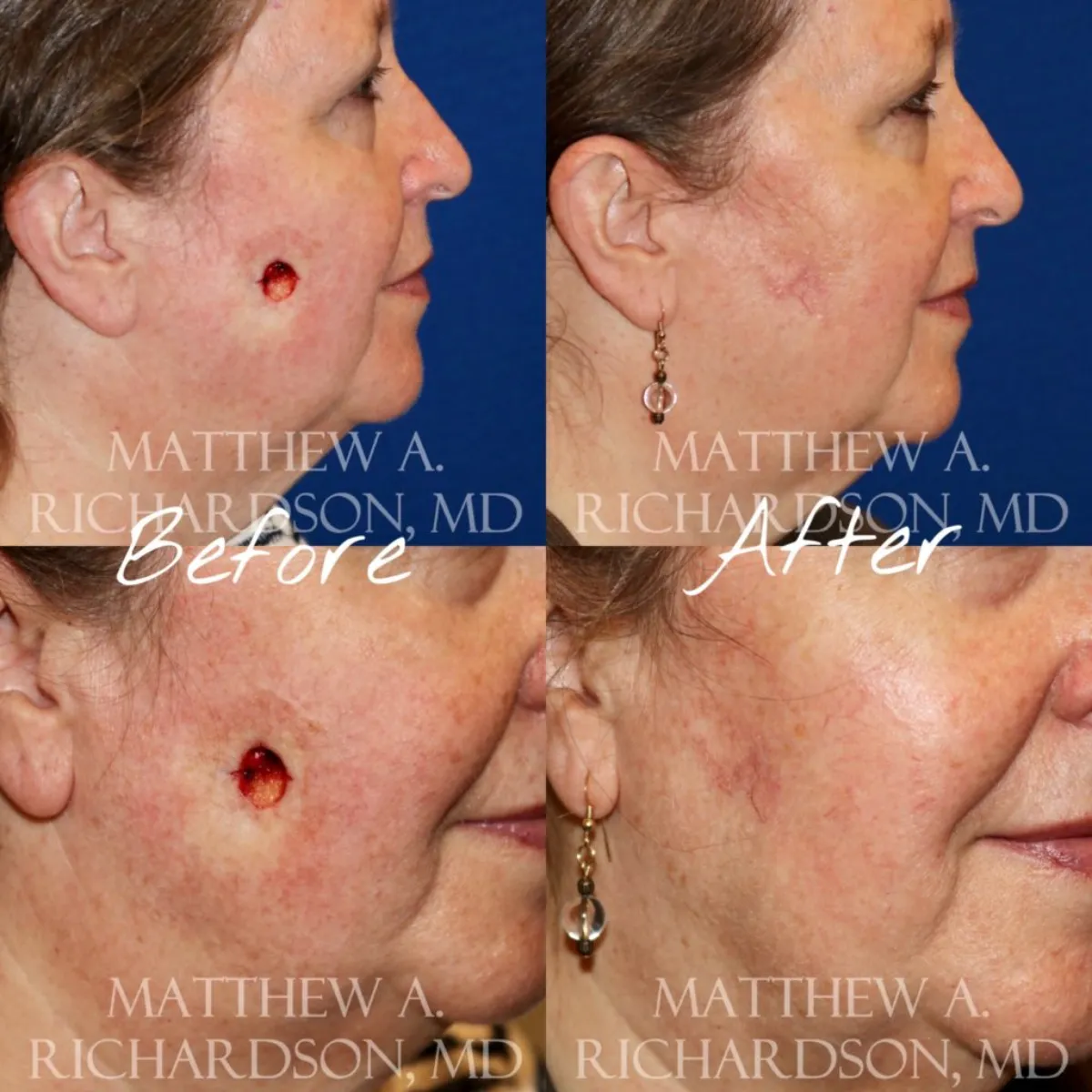Skin Cancer Reconstruction
Conveniently Located to Serve the Dallas, Fort Worth, Collin, and Denton Counties.
Conveniently Located to Serve the Dallas, Fort Worth, Collin, and Denton Counties.
Conveniently Located to Serve the Dallas, Fort Worth, Collin, and Denton Counties.



What is skin cancer? What are the types of skin cancer?
Skin cancer is abnormal growth of skin cells that essentially grow in an uncontrolled fashion. These cells can become locally invasive and destroy surrounding normal tissues. Skin cancer can also spread throughout the body to other areas, including lymph nodes and other body organs. This spread of cancer is known as metastasis.
There are many different types of skin cancer. The most common types of skin cancer are basal cell carcinoma, squamous cell carcinoma, and melanoma. Melanoma is the most dangerous of these types of skin cancer, but all skin cancers can be dangerous or even fatal. Basal cell carcinoma is the least dangerous of the types of common skin cancer, and usually only causes local destruction and spread without distant spread. There are many other types of less common skin cancers, including merkel cell carcinoma, sebaceous carcinoma, and other rare types.
I have a lesion or spot on my face that I am worried about. Who should I see? What kind of doctor treats skin cancer?
Many different medical specialties are capable of diagnosing and treating skin cancer. Primary care doctors, dermatologists, facial plastic surgeons, otolaryngologist – head and neck surgeons, and general plastic surgeons may all commonly see and treat skin cancers. As facial plastic surgeons, we are highly qualified to examine, biopsy, diagnose, and treat skin cancers within the head and neck area, including the face, neck, scalp, ears, and nose.

Dr. Richardson and Dr. Cain have extensive experience with skin cancer of the face, nose, neck, ears, and scalp, and are often called upon to reconstruction of facial defects created by skin cancer resection, commonly performed by Dermatologists and known as Mohs Surgery. Many times, a patient will elect to have a Facial Plastic Surgeon repair the defect after the skin cancer has been removed, or a Dermatologist will refer the patient to us due to the location, size, or difficulty of the repair. This is known as skin cancer reconstruction, Mohs reconstruction, or Mohs repair. Read below for more details.
Does skin cancer need a biopsy? How do you diagnose skin cancer?
In order to definitively diagnose a skin cancer, a biopsy is required. There are many different ways to perform a biopsy for skin cancer, including punch biopsy, shave biopsy, and excisional biopsy. Some suspicious skin lesions may require an assessment of the depth of the lesion. We try to recommend biopsy techniques that result in minimal scarring whenever possible.
What is Mohs surgery? Why do I need Mohs surgery?
When skin cancer is excised surgically, the most important component is that the skin cancer is removed completely. This involves removing the entire skin cancer and a margin of normal surrounding tissue. Mohs surgery is a technique of excising skin cancer with close margins and minimal removal of normal tissue. There are special excision techniques and processing techniques of the tissue in order to examine the tissue under the microscope and achieve these goals. Mohs surgery is almost always performed by a dermatologist.
What is reconstructive surgery?
Reconstructive surgery is the process of surgical repair of a wound or injury. In this case, we are referring to reconstructive of Mohs defects created by a dermatologist in order to excise skin cancer. As facial plastic and reconstructive surgeons, we are uniquely qualified to perform facial reconstructive surgery for skin cancer defects. These defects often occur around the nose, mouth, ears, or eyes, and these areas are critically important for the aesthetic appearance and function of the affected structures.
Will I have a scar after Mohs surgery? Does skin cancer leave a scar?
Any time an incision is made in the skin, a scar will be left behind, but our expertise will allow these injuries to heal quickly and minimize any scarring as much as possible. We also know that going through treatment for facial skin cancer can be a traumatic experience, so we make every effort to make the reconstruction process simple and pleasant for each patient. CLICK HERE to look through our before and after gallery of skin cancer reconstruction patients.
What are the risks of skin cancer surgery or reconstruction?
The risks of skin cancer surgery and reconstruction are similar to most other types of surgical procedures. Risks include bleeding, bruising, swelling, scarring, infection, pain, recurrence of the skin cancer, nerve injury, need for future procedures (including re-excision and/or scar revision), medication reactions, and anesthesia complications. In general, facial skin cancer removal and reconstruction is very safe with low risks. The biggest issue for most patients is the scar that results from surgical removal of a skin cancer and subsequent reconstruction. Luckily, our skills and knowledge generally allows us to achieve minimal scarring for our patients.
Does all skin cancer require Mohs surgery?
No, Mohs surgery is most commonly used for facial skin cancers near critical structures like the nose, ears, mouth, and eyes. Mohs surgery allows for removal of the least possible amount of normal tissue. Small skin cancers on the face (for instance on the forehead or cheeks) might not require Mohs technique. Mohs surgery might be used on other areas of the body, but is most commonly used on the face.
How are Mohs surgery defects reconstructed?
Skin cancer defects in the head and neck area or facial skin may require complex closure, local tissue flaps, regional tissue flaps, skin grafts, cartilage grafts, or skin and cartilage grafts known as composite grafts. Some Mohs defects are very small and simple and can be closed primarily, with just a few sutures.
What is a Mohs surgery day like?
In most cases, a patient will have surgical excision of their facial skin cancer by the Mohs surgeon. The Mohs surgeon is a dermatologist, and we work with many local dermatologists for complex skin cancer cases on the face, neck, scalp, nose, and ears. This Mohs surgery is generally performed under local anesthesia. A dressing is placed on the wound. The patient is then sent to our practice for reconstruction of the defect by Dr. Richardson or Dr. Cain.
In some cases, repair of skin cancer defects may require only a simple closure with a few dissolvable sutures placed under local anesthesia. In other patients, Mohs repair may require extensive undermining or flap procedures that might not be well-tolerated under local anesthesia. In these cases, we may be able to perform your procedure under IV sedation in our private surgical suite, or you may require general anesthesia at one of the local hospitals. Dr. Richardson and Dr. Cain can discuss these details with you in person.
Mohs repair is something that we are passionate about, and is one of the most rewarding procedures that we perform. We accept many different types of insurance coverage and will file any claims on your behalf with your insurance company.

“Exemplary Care”
“Dr. Richardson performed reconstructive surgery following Mohs’s removal of a basal cell cancer which was beneath my right eye. From the initial consultation, throughout the surgical procedure and my post-op appointment, I was impressed with the professionalism and exemplary care by this surgeon AND his staff. Dr. Richardson explained the procedure and what to expect during the healing process very well and I was comforted by his personalized care. I am very pleased with my outcome. At four months post-op it is hard to tell where the scar is located! I recommend Dr. Richardson highly and without reservation.”
(GOOGLE)

*Individual Results may vary.
Real Patient Photo Gallery
View before-and-after pictures of real patients
How can I set up a Skin Cancer Reconstruction Consultation?
Call or text Texas Facial Aesthetics at 469-362-6975 to set up a consultation with either Dr. Matthew Richardson or Dr. Jordan Cain. You can also email us at info@txfaces.com for more information.
